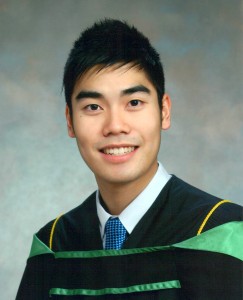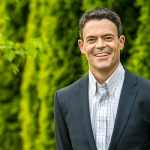 “The flexibility of the Kinesiology program has allowed me to pursue and develop my academic interest in rehabilitation for people with disabilities.”
“The flexibility of the Kinesiology program has allowed me to pursue and develop my academic interest in rehabilitation for people with disabilities.”
For Alvin Ip, the path to medical school began to emerge while he was a Kinesiology undergraduate student conducting research in rehabilitation for people with disabilities.
Alvin graduated from the Interdisciplinary Studies stream at the UBC School of Kinesiology in 2012 and recently completed his 2nd year of medical school at UBC. As an active member of the student community, he has served as Co-Editor-in-Chief of the UBC Medical Journal, Vice President Communications of Students Interested in Internal Medicine, and Executive Team member of the Sports Medicine Interest Group.
As an undergraduate student, Ip became passionate about exploring Physical Medicine and Rehabilitation, a medical specialty concerned with restoring functional ability and quality of life in patients with neurological and musculoskeletal disabilities.
Looking back on his undergraduate years, Ip describes completing a research project from beginning to end as the highlight of his Kinesiology degree. Under the supervision of Dr. Tania Lam in KIN 499 (Directed Studies in Kinesiology), Ip was able to conduct research on a new strategy for stroke rehabilitation. “I recruited people from the community with stroke and pilot-tested a novel rehabilitation strategy to alleviate the walking asymmetry that people suffer after stroke,” says Ip. “This research is important because there is strong evidence that walking asymmetry leads to impaired balance, decreased bone strength, and increased falls.”
After concluding his research project, he presented his findings at the UBC Multidisciplinary Undergraduate Research Conference, where he won the ‘Top Oral Presenter’ award. Subsequently, he was selected to represent UBC at the Universitas21 Undergraduate Research Conference in Japan to showcase his research at the international level.
It is no surprise, then, that Ip credits his Kinesiology experience to his interest in medicine, and his aspiration to specialize in Physical Medicine and Rehabilitation.
“My undergraduate experience in Kinesiology has provided me with a strong foundation in human anatomy and physiology with applications to rehabilitation, as well as early exposure to this interesting and rewarding medical specialty.”
Currently, he is participating in a medical student summer internship in Physical Medicine and Rehabilitation at the University of Pittsburgh Medical Center in Pittsburgh, Pennsylvania. According to Ip, he applied to this program because he was eager to explore how he could incorporate his passion for working with people with disabilities into his future clinical responsibilities as a physician.
As part of his internship, Ip is working with physicians and other members of the health care team to care for patients with spinal cord injury, stroke, traumatic brain injury, and other conditions.
“I am also learning more about the roles and responsibilities of occupational therapy, physical therapy, and speech-language pathology, which is very important because these professions provide the therapies that patients receive,” he says.
Throughout his time in medical school, and during his current internship, he has found his Kinesiology courses very relevant and helpful. Specifically, he credits KIN 190 with Dr. Tania Lam, KIN 275 with Dr. Maria Gallo, KIN 389 with Dr. Timothy Inglis, and KIN 473 with Dr. Mark Carpenter as being invaluable to his undergraduate experience. “I am very fortunate to have been taught by passionate and inspiring professors,” says Ip.
Apart from his medical studies, he enjoys giving back to his community through various organizations such as the Richmond Centre for Disability, The Salvation Army Rotary Hospice House and Volunteer Richmond Information Services, with one of his most fulfilling activities being a Mentor in the Kinesiology Mentorship Program.
His advice to current students and alumni? “Don’t be afraid to reach out for help when you need it. People are usually more than willing to help out in any way they can – but only if you ask. At the same time, and equally as important, don’t forget to thank the people who have helped you get to where you are.”
